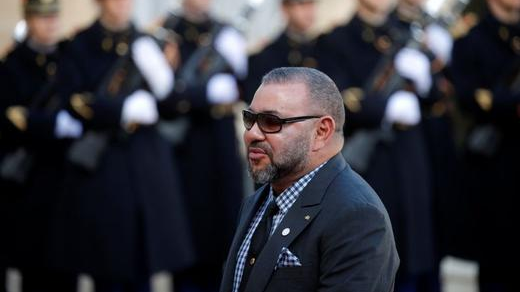
Morocco's King Mohammed VI arrives for a lunch at the Elysee Palace as part of the One Planet Summit in Paris, France, December 12, 2017. /Reuters
Morocco's King Mohammed VI arrives for a lunch at the Elysee Palace as part of the One Planet Summit in Paris, France, December 12, 2017. /Reuters
Morocco's plan to normalize ties with Israel following a deal brokered by the United States was met with rejection both at home and abroad on Saturday.
A core element of the deal brokered by President Donald Trump was U.S. recognition of Morocco's claim to sovereignty over the Western Sahara. A decades-old territorial dispute has pitted Morocco against the Algeria-backed Polisario Front, which seeks to establish an independent state.
Algeria on Saturday called Washington's recognition of Morocco's sovereignty over the entire Western Sahara territory "illegal."
The U.S. decision "has no legal effect as it stands against all UN resolutions," the Algerian Foreign Ministry said in a statement.
The deal, announced by Trump on December 10, would "undermine the de-escalation efforts that have been made at all levels in order to pave the way for launching a real political path" and convince the disputing parties to engage in a UN-brokered dialogue with the support of the African Union, it noted.
"The prevalent conflict in the Western Sahara is a case of decolonization which can be solved only through the implementation of international conventions and the prevailing doctrine of both the United Nations and the African Union relating to this issue," the foreign ministry added.
The Polisario Front condemned the deal immediately after Washington's announcement, saying in a statement that it is "a blatant violation of the United Nations charter and the resolutions of international legitimacy." The move "obstructs efforts by the international community to find a solution to the conflict," the group added.
On Saturday, Morocco's main Islamist groups also voiced their opposition to Rabat's plans to normalize ties with Israel.
The religious branch of the co-ruling PJD party, the Unity and Reform Movement (MUR), said the move was "deplorable" and denounced "all attempts at normalization and the Zionist infiltration."
The Islamist PJD party was more nuanced however, endorsing King Mohammed VI's support for the Palestinian cause while reiterating the party's "firm position against the Zionist occupation."
"The United States made an important proclamation that stresses Morocco's sovereignty over its southern provinces and opens new horizons for strengthening Morocco's position in international circles. It also further isolates the adversaries of our territorial integrity," the PJD said in a statement.
The Western Sahara was partitioned between Morocco and Mauritania at the end of Spain's colonial rule in 1976. When Mauritania, under pressure from Polisario guerrillas, abandoned all claims to its portion in August 1979, Morocco moved to occupy that sector and has since asserted administrative control over the whole territory.
Fighting between Morocco and the Polisario Front, which has been pushing for the independence of Western Sahara, resulted in a cease-fire deal in 1991, monitored by the UN. But a planned referendum on independence was never held, leaving the territory's final status unresolved.
(With input from agencies)

